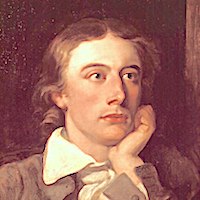

Tao Te Ching

portrait by William Hilton
John Keats
1795 – 1821 CE
Writer of "poems as immortal as English"
One of the most popular poets of all time, Keats—in just 25 years of life—wrote what Will Durant called, “poems as immortal as English, and more perfect than Shakespeare.” Borges said that reading him was the most influential literary experience of his life, Tennyson called him the greatest poet of the 19th century, and Shelley wrote that his death was a national tragedy. He studied medicine and received a license to practice as a doctor and surgeon but chose the pure poverty of writing over financial security and social respect. During his lifetime, he published three volumes of poetry but during that time, sold only c. 200 copies. And far from foreseeing his future popularity, shortly before dying wrote, "I have left no immortal work behind me—nothing to make my friends proud of my memory.” His fame quickly grew however and his legend continues today in universities, movies, and books by authors including Dan Simmons, Tim Powers, and Julie Bozza.
Lineages
British Poets Romanticist
Eras
Western
Romantacism (1800 – 1850 CE)Chinese
Qing dynasty (1644 – 1912 CE)Unlisted Sources
Epitath on his tombstone
Lamia, 1820
Letters
letters 1819
Letters, 1817
Ode on a Grecian Urn, 1819
Ode on Melancholy, 1819
Ode to a Nightingale, 1820
Quotes by John Keats (16 quotes)
“I am certain of nothing but of the holiness of the heart's affections, and the truth of Imagination… My Imagination is a Monastery and I am its Monk.”
from Letters
Comments: Click to comment
“The poetic mind has no self, no character, no identity; it is every thing and nothing, continually filling some other Body: The Sun, the Moon, the Sea and Men and Women”
Comments: Click to comment
“Our names united before the whole world as representative of the unity that a man and woman can achieve and must achieve – and will achieve all over the world… the deep companionship that has developed between us so that we almost have one breath, one life, one interest.”
Comments: Click to comment
“The main quality that goes into a Man of Achievement is ‘Negative Capability’—the capacity for staying with uncertainties, mysteries, doubts, without any irritable reaching after fact and reason.”
Comments: Click to comment
“The excellence of every art is its intensity, capable of making all disagreeables evaporate from their being in close relationship with beauty and truth.”
from Letters, 1817
Comments: Click to comment
“Charm'd magic casements, opening on the foam
Of perilous seas, in fairy lands forlorn.”
from Ode to a Nightingale, 1820
Comments: Click to comment
“The only means of strengthening one’s intelligence is to make up one’s mind about nothing—to let the mind be a thoroughfare for all thoughts.”
from letters 1819
Comments: Click to comment
“Beauty is truth, truth beauty—that is all
Ye know on earth, and all ye need to know.”
from Ode on a Grecian Urn, 1819
Comments: Click to comment
“Philosophy will clip an Angel’s wings… Do not all charms fly at the mere touch of cold Philosophy?”
Comments: Click to comment
“Heard melodies are sweet, but those unheard are sweeter;
Therefore, ye soft pipes, play on.”
from Ode on a Grecian Urn, 1819
Comments: Click to comment
“Love in a hut, with water and a crust,
Is—Love, forgive us!—cinders, ashes, dust;
Love in a palace is perhaps at last
More grievous torment that a hermit's fast.”
from Lamia, 1820
Comments: Click to comment
“This grave contains all that was mortal of a young English poet, who, on his deathbed, in the bitterness of his heart at the malicious power of his enemies, desired these words to be graven on his tombstone, 'Here lies one whose name was writ in water.'”
from Epitath on his tombstone
Comments: Click to comment
“She dwells with Beauty—Beauty that must die;
Bidding adieu; and aching Pleasure nigh,
Ay, in the very temple of Delight
His soul shalt taste the sadness of her might”
from Ode on Melancholy, 1819
Comments: Click to comment
“a philosophical Quaker full of mean and thrifty maxims”
Comments: Click to comment
“You speak of Lord Byron and me — there is this great difference between us. He describes what he sees — I describe what I imagine. Mine is the hardest task.”
Comments: Click to comment
“Is there another Life? Shall I awake and find all this a dream? There must be... We cannot be created for this sort of suffering.”
Comments: Click to comment
Quotes about John Keats (2 quotes)

“This grave contains all that was mortal of a young English poet, who, on his deathbed, in the bitterness of his heart at the malicious power of his enemies, desired these words to be graven on his tombstone, 'Here lies one whose name was writ in water.'”
Comments: Click to comment

“Keats is not content to give either of these competing drives a simple victory. He does not say that beauty is defeated by the inevitability of death, or that death is an illusion that beauty’s radiance can dispel. Instead, the poems are a series of sustained balances... To be defeated by sorrow, in this poem, is to triumph over it. The poet’s reward is no longer to collect a trophy from posterity but to become a trophy himself—as though his suffering and his pleasure were an offering to the gods.”
Comments: Click to comment
Comments (0)